The way you tell the story makes all the difference.
Publications
-
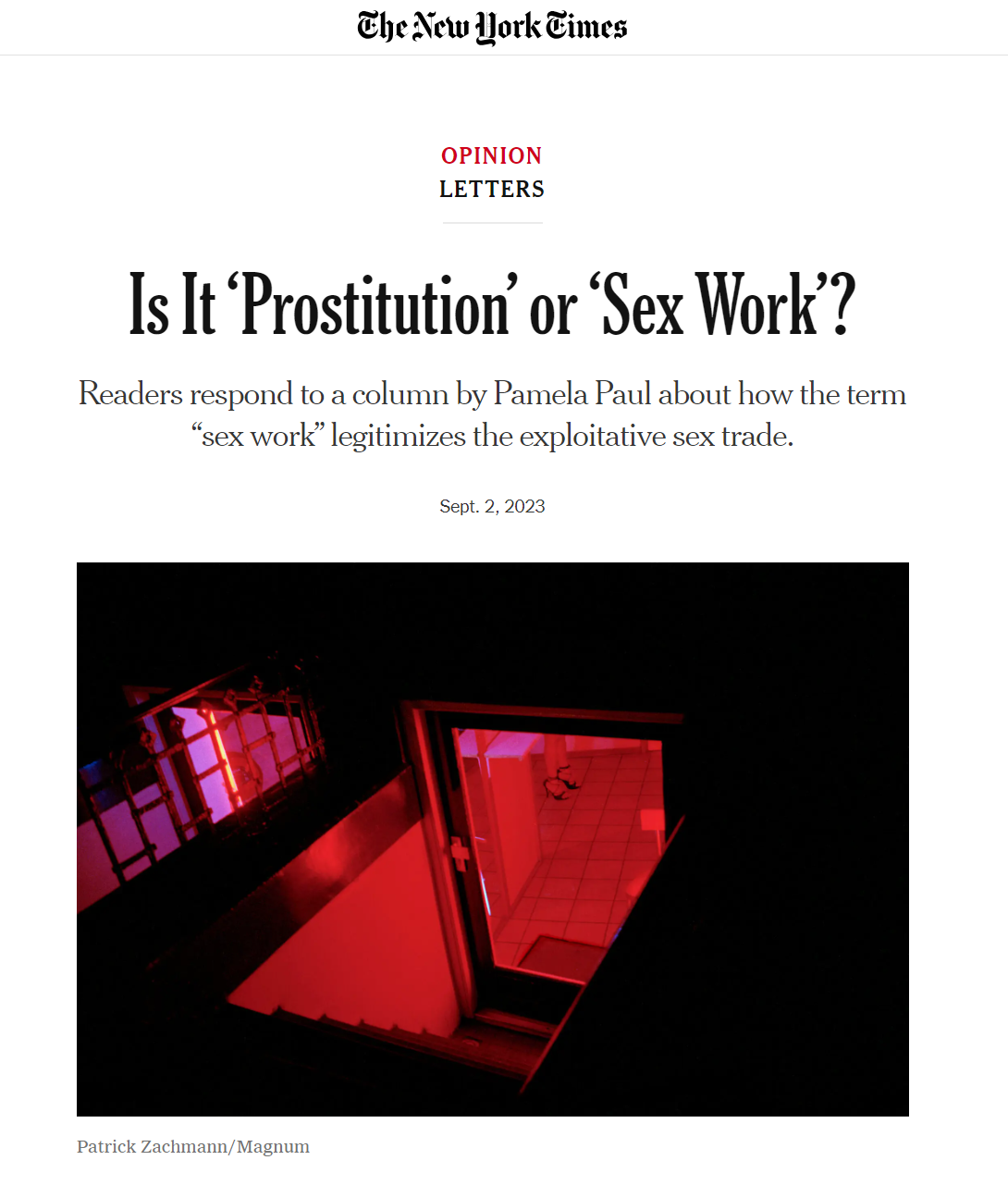
New York Times: LTE in Response to Pamela Paul Op-Ed
In my letter to the editor published in The New York Times, I made it clear that I am not a “former sex worker,” but a survivor of a system of oppression. As someone who survived the sex trade and who later served as the national campaign manager for World Without Exploitation, I strongly disagreed with the idea that prostitution is a job like any other. I emphasized that the term “sex work” downplays the extreme violence and exploitation faced by those in the sex trade, citing research showing high rates of PTSD, rape, and physical assault among those exploited. Prostitution isn’t a job—it’s a system based on power imbalances, where men with disposable income prey on the most vulnerable. We need to call it what it truly is: exploitation and violence, not “sex” or “work.”
-

Wall Street Journal: A Survivor of the Sex Trade Details How to Dismantle It
In my letter published in the Wall Street Journal, I shared why the Fight Online Sex Trafficking Act and the Stop Enabling Sex Traffickers Act (FOSTA-SESTA) are so important. These laws have significantly disrupted the online sex trade, reducing exploitation in isolated settings like apartment brothels and challenging the harmful notion that women can be bought as easily as a pizza.
Drawing from my own experiences in the sex trade—as a teen runaway and later as an escort—and my work with survivors, I’ve seen firsthand how increased demand fuels trafficking rather than empowering individuals. FOSTA-SESTA represents a critical step forward, holding companies accountable and limiting traffickers’ ability to exploit vulnerable people with impunity. These laws help protect the fundamental right not to be bought and sold—a right everyone deserves.
-
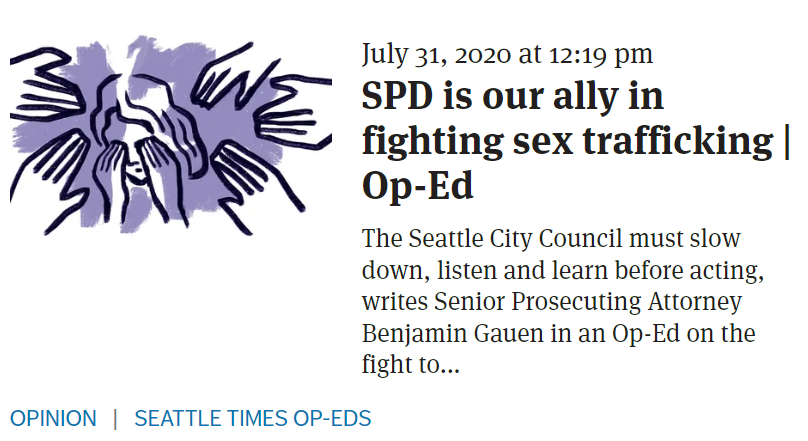
Seattle Times: SPD is our ally in fighting sex trafficking
In our op-ed, Ben Gauen and I argue that the Seattle Police Department (SPD) plays a critical role as an ally in the fight against sex trafficking. We highlight the importance of law enforcement in addressing the demand for commercial sex, which drives trafficking, and emphasize that efforts like Seattle’s “Buyer Beware” program, targeting those who purchase sex, are essential to dismantling the market for exploitation. While we acknowledge the complex relationship between survivors and police, we stress that working together with law enforcement, service providers, and advocates is crucial for creating a future where no one is bought or sold. By supporting efforts to criminalize buyers and decriminalize those who are exploited, we believe we can foster a system that prioritizes justice and the well-being of survivors.
-

Salem News: Letter: Proposed bills are crucial steps in protecting victims
In my letter to the editor of the Salem News, I voiced my strong support for The Sex Trade Survivors Act, a crucial piece of legislation aimed at decriminalizing those who are being exploited in the sex trade while holding sex buyers and exploiters accountable. This bill strikes a middle-ground approach by reducing criminalization for victims while maintaining penalties for those profiting from exploitation. As a member of the No Place for a Child coalition, I believe this partial decriminalization will offer much-needed legal reform, especially for vulnerable populations, while sending a clear message that exploitation will not be tolerated.
-

Dignity Journal: Exited Prostitution Survivor Policy Platform
In co-authoring the "Exited Prostitution Survivor Policy Platform" published in Dignity: A Journal of Exploitation and Violence, I contributed to the creation of a comprehensive framework aimed at addressing the systemic harms of prostitution. Our platform prioritizes three main pillars: criminal justice reform, fair employment opportunities, and robust standards of care for survivors. By advocating for vacatur laws, vocational support, and survivor-centered services, we aim to dismantle the barriers that prevent survivors from fully reintegrating into society. Our collaborative approach underscores the importance of treating survivors as valuable individuals capable of reclaiming their autonomy and realizing their full potential.
-
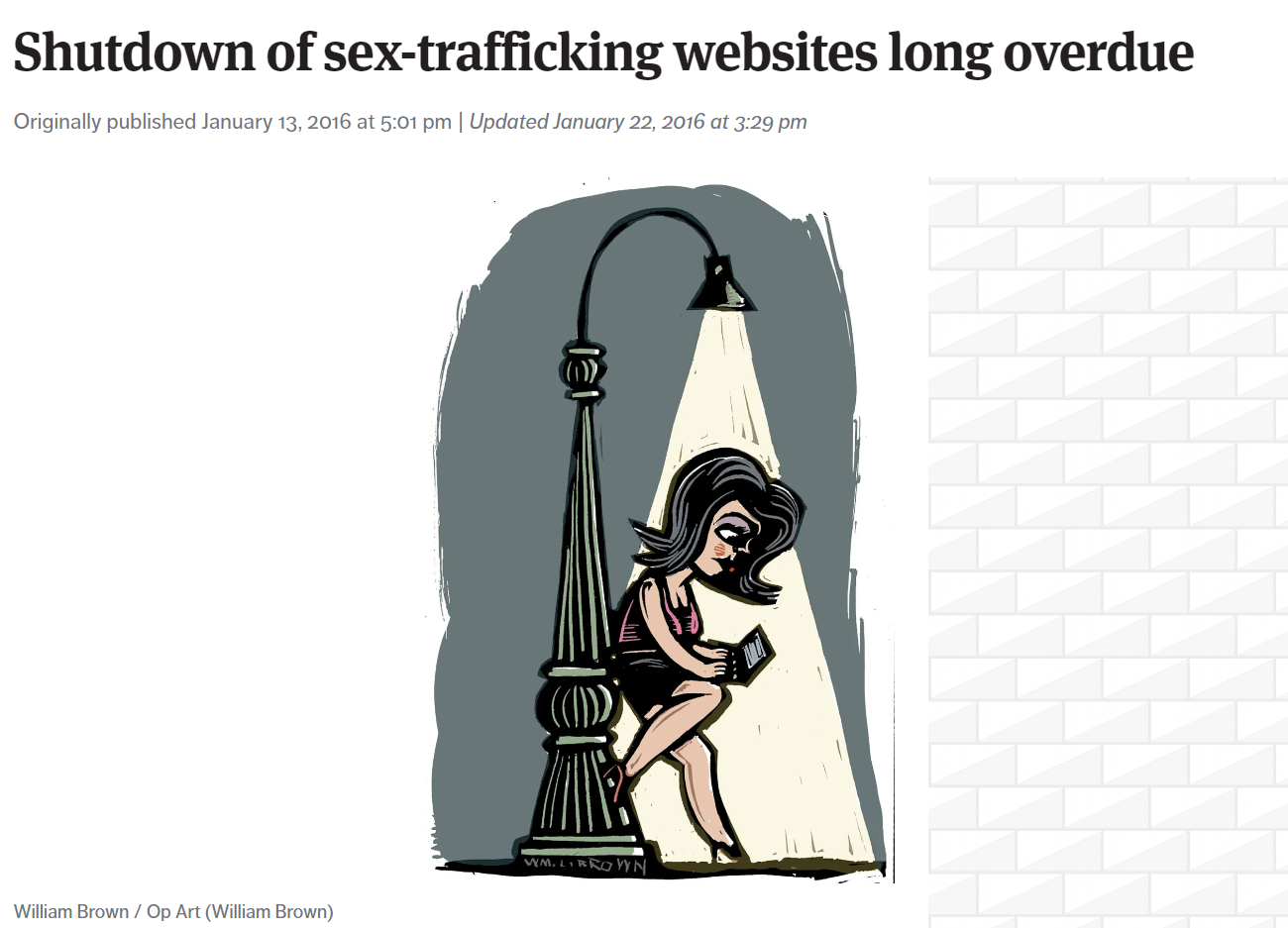
Seattle Times: Shutdown of sex-trafficking websites long overdue
In my op-ed for The Seattle Times, I argue that the shutdown of sex trafficking websites like The Review Board was long overdue and necessary to protect exploited women. These sites allow sex buyers to treat women as commodities, reducing them to objects that can be reviewed and rated like products, which perpetuates violence and exploitation. Contrary to claims that these sites provide safety by screening dangerous buyers, my experience shows they do not protect women from harm. The real fight isn’t between sex workers and survivors; it’s against the traffickers, pimps, and buyers who exploit us. Survivors like me are here to support those still in the life, and our goal is to ensure no woman has to face this violence alone. We must focus on holding sex buyers accountable for the violence they perpetuate and move beyond the divisive debates that distract from the real issue.
-
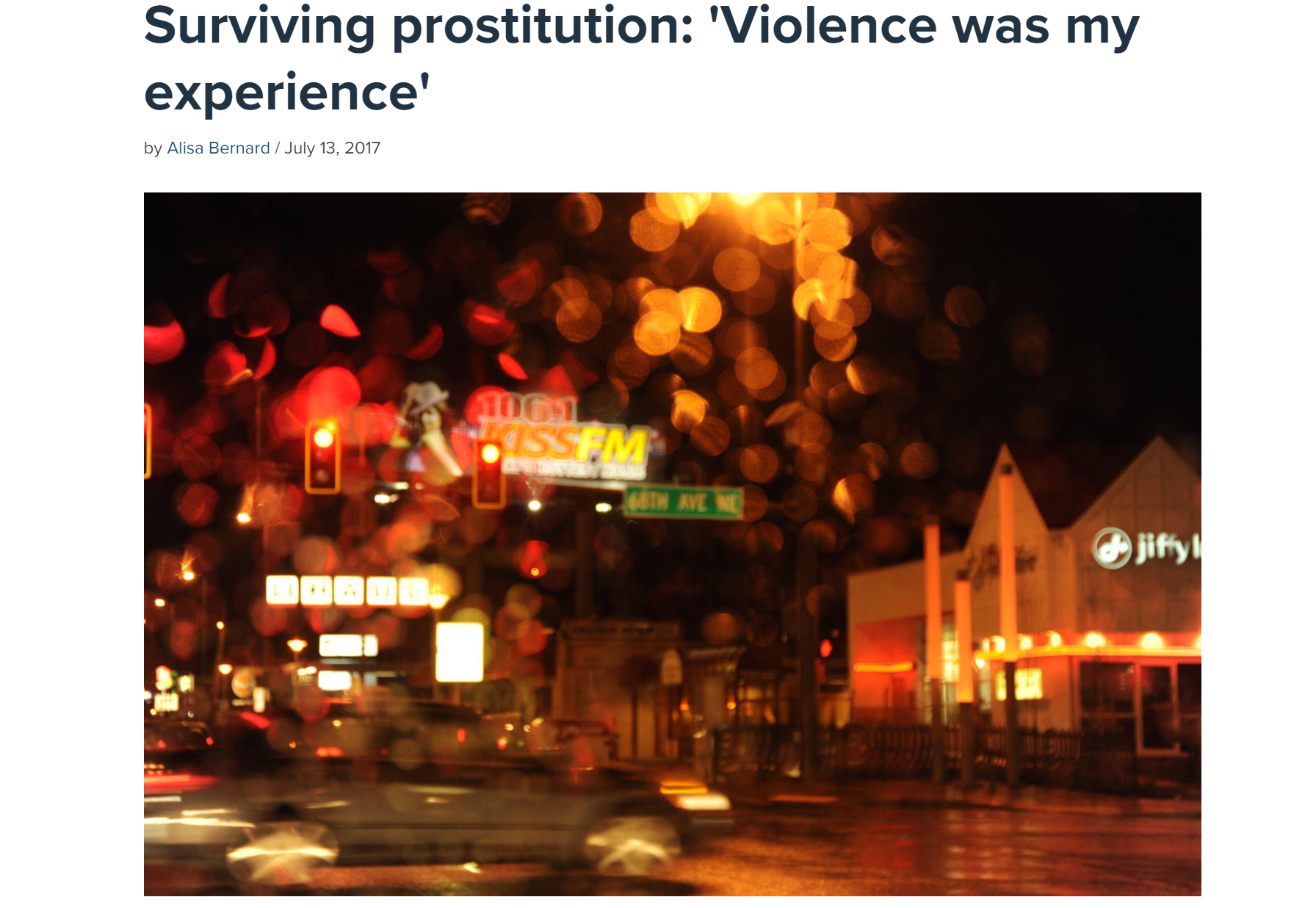
PBS: Surviving prostitution: 'Violence was my experience'
In my op-ed for Cascade PBS, I argue that prostitution is inherently violent and dangerous, with sex buyers contributing to the exploitation and harm of women and girls. I emphasize that prostitution is not a legitimate job choice, as it often involves coercion, violence, and control by pimps or traffickers. I highlight the stark reality that many women in prostitution, including myself, have experienced abuse, rape, and trauma. By fueling the sex trade, buyers perpetuate this cycle of violence, often unaware or indifferent to the suffering they cause. I call for more accountability for sex buyers and emphasize the need for greater access to support services for women trying to escape prostitution.
-

Blog: CSE Institute Kicks off New Blog Series, “Survivor Voices” – Our First Installment, “What Makes a Good Survivor Ally?” features Ms. Alisa Bernard
In my guest blog post for the CSE Institute, I explore what makes a good ally to survivors of prostitution and trafficking. I argue that the best allies aren’t those who treat survivors as fragile victims or try to remove every obstacle, but rather those who treat us as equals—human beings capable of navigating our own challenges. Good allies understand that survivors, like anyone else, will stumble along the way but are resilient enough to get back up. They honor our past trauma without defining us by it, respecting us as individuals rather than merely focusing on our stories. Ultimately, being a good ally means supporting us through our journey without overthinking or overcompensating, allowing us to move forward on our own terms.
-

Blog: It Doesn’t Take a Third Party
In my guest post for Prostitution Research and Education, I argue that the victimization of women in prostitution should not be dependent on the presence of a third party, like a trafficker or pimp. Many organizations only recognize harm in prostitution if coercion by a third party is involved, which dismisses the real harm experienced by women who entered prostitution independently. This narrow view not only questions the validity of my own experience but also denies services and justice to many others who suffer. Just as no one questions whether a woman is raped based on the presence of an accomplice, we should not require a third party to acknowledge the harm caused by prostitution. By insisting on this “third-party litmus test,” these organizations perpetuate shame and guilt for survivors and fail to recognize the deep, lasting trauma inflicted by prostitution itself.
-
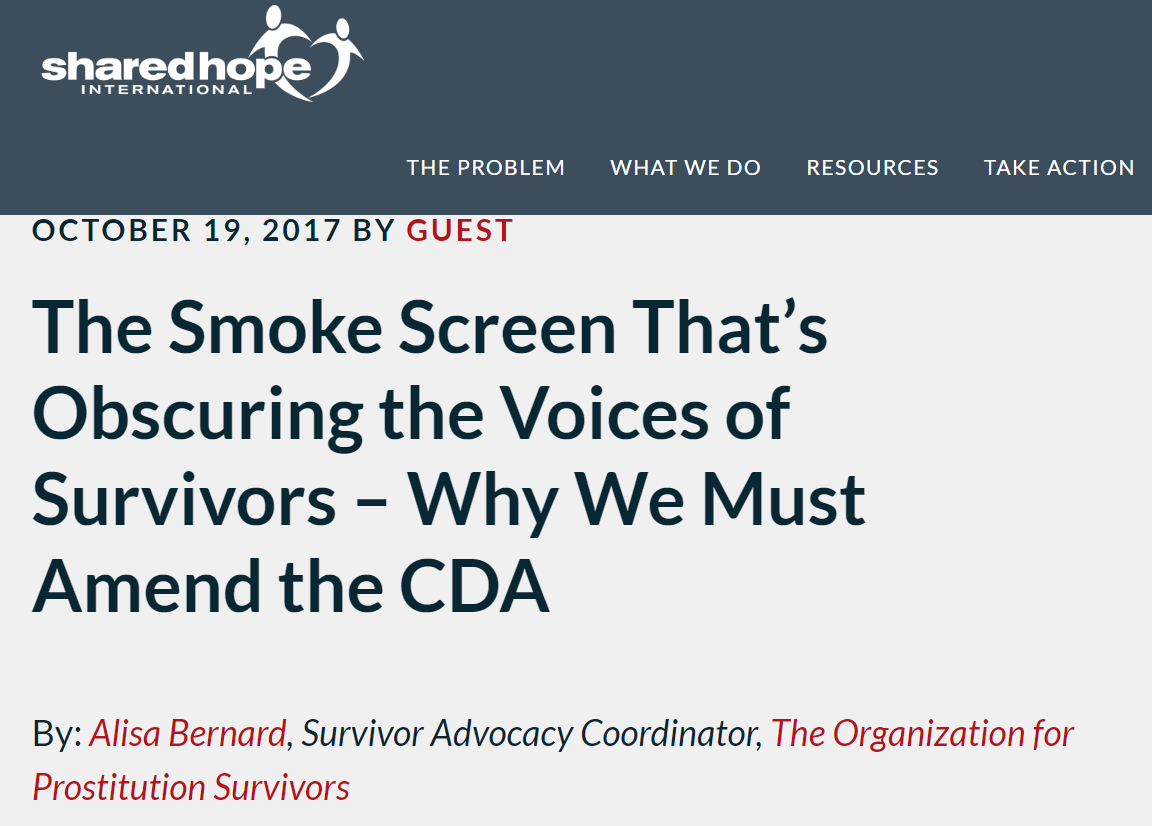
Blog: The Smoke Screen That’s Obscuring the Voices of Survivors – Why We Must Amend the CDA
In my blog post for Shared Hope International, I emphasize the urgent need to reform Section 230 of the Communications Decency Act (CDA) to hold internet service providers accountable for their role in facilitating online sex trafficking. The current protections under the CDA allow platforms like Backpage.com to profit from the exploitation of women and girls, while hiding behind legal loopholes that make it nearly impossible to trace traffickers or identify victims. I argue that the internet has normalized the buying of sex, turning women and girls into commodities. The proposed reforms to Section 230 are not an infringement on free speech, but a necessary update to address the evolving landscape of technology and exploitation. It is crucial to close the legal gaps that enable traffickers to operate with impunity, and to ensure that tech companies cannot continue to profit from these harmful practices under the guise of protecting free expression.
Media
-

One-in-ten: The men who are driving the commercial sex market
In this episode, I share my experience from the front lines of the anti-trafficking movement, where I’ve worked to support survivors and combat the commercial sex industry. Drawing from my work with organizations like NCMEC and the EPIK Project, I discuss the tactics used by sex buyers and traffickers, and what it will take to dismantle the industry. Through my role at WorldWE and past work with Thistle Farms and the Organization for Prostitution Survivors, I’ve advocated for policy change and led training efforts across the U.S. and Canada to reduce exploitation and support those impacted by it.
-

March Madness Sparks Sex Trafficking Concerns as NCAA Final Four Nears
In my interview for Hoodline Phoenix, I highlighted the harsh reality that sex trafficking occurs in every city, every day, and the influx of men during major events like the NCAA Final Four can exacerbate the problem. Drawing from past events like last year’s Super Bowl in Glendale, where over 300 arrests were made in connection with trafficking, I explained how vulnerable populations—often facing challenges like income inequality and houselessness—are targeted by traffickers. I emphasized the need to stop buyers and provide support for those being trafficked, advocating against punishing the victims. My goal is to bring awareness to the systemic issues that fuel trafficking and push for stronger preventative measures.
-

Court hearings to be open as feds seek charges against clients in Mass. brothel bust case
In my interview with NBC10 Boston, I emphasized that the demand for commercial sex is what fuels trafficking. If people weren’t buying sex, traffickers wouldn’t exploit individuals. I discussed how exposing the names of buyers can be an equitable tool to holding them accountable and curbing demand. At World Without Exploitation, we’re pushing for legislation that will not only stop the arrest of those who are exploited but also expand resources to help victims rebuild their lives. My goal is to shift the focus from punishing victims to targeting the buyers and traffickers who perpetuate the cycle of exploitation.
-

Sex trafficking could increase during Final Four
In my interview with ABC15 Arizona, I discussed the link between trafficking and major events like the upcoming NCAA Final Four. I emphasized that whenever there’s an influx of men with disposable income, sex trafficking tends to spike, as we saw during last year's Super Bowl in Glendale. I highlighted how trafficking disproportionately impacts vulnerable populations—such as underage youth, those facing homelessness, and individuals experiencing poverty or substance abuse. My hope is that future operations will focus on targeting the buyers and providing support for those being exploited, rather than punishing the victims.
-

Activists say many efforts to help sex trafficking victims in New York are stalled
In my interview with CBS New York, I discussed the tragic connection between the Gilgo Beach murders and sex trafficking, highlighting how sex buyers, like Rex Heuermann, may have been caught sooner if law enforcement took sex buying seriously as a crime. I shared my personal experience, acknowledging that every time I took a call in the sex trade, the fear of violence was always present. I emphasized that most individuals don’t enter the sex trade by choice, and once they’re in, escaping is incredibly difficult due to the high levels of violence. I called for stronger laws to hold sex buyers, pimps, and traffickers accountable to prevent future tragedies like Gilgo Beach. Without such change, I believe these horrors will continue.
-

National coalition warns about the dangers of human trafficking ahead of NCAA tournament in Charlotte
In my interview with WBTV3 Charlotte, I discussed the increased risk of human trafficking during large events like March Madness, emphasizing that trafficking happens daily in every city, but events like this intensify the demand for sex buying. I shared my personal experience as a survivor, explaining how vulnerable populations, such as runaway youth like I was, are at higher risk of exploitation. I also highlighted that many victims don’t recognize their situation as exploitation, see it as the best of bad options. I urged people to report suspicious activity to the National Human Trafficking Hotline rather than intervening directly, stressing the importance of professional help in addressing these situations.
-

Gilgo Case Shows There's No Way To Screen For Killers, Advocate Says
In my interview with The Patch, I emphasized that there’s a dangerous misconception that those in prostitution can somehow screen for dangerous clients. I explained that there’s no way to distinguish between an "average" sex buyer and someone like the Gilgo Beach killer. This misconception shifts blame onto victims rather than addressing the root of the issue—the demand for commercial sex. I highlighted that many victims of prostitution are disproportionately marginalized, including women of color and LGBTQ individuals, and stressed the need to hold buyers accountable. I also pointed out that the trauma of being in the sex trade leaves many with severe mental health challenges, further illustrating why this industry is far from harmless.
-

Advocates push states, including Pa. to take up ‘survivor-centered’ trafficking laws
In my interview with the Capital Star, I emphasized the importance of adopting survivor-centered, partial decriminalization laws to combat sex trafficking and exploitation. Full decriminalization, which some states have considered, would increase demand for commercial sex and lead to greater exploitation of vulnerable populations, such as underage girls and women of color. By contrast, the partial decriminalization model, which holds exploiters accountable while protecting those being prostituted, empowers survivors to come forward. I pointed out that, like in Maine, such laws provide survivors with greater agency and legal protection. While Pennsylvania hasn't yet adopted similar legislation, I, along with other advocates, am working on building dialogue with policymakers to pursue more nuanced, common-sense approaches to end trafficking.
-

World Without Exploitation, joins Kurt & Anthony to discuss Human Trafficking Issues.
In my interview with The Morning Drive on WVMT Radio, I discussed the critical role of targeting sex buyers to combat human trafficking and exploitation. I explained how the demand for commercial sex fuels trafficking and how holding buyers accountable is key to reducing exploitation. I shared insights from my work with World Without Exploitation, emphasizing the need for survivor-centered policies that protect vulnerable populations while penalizing traffickers and buyers. I also talked about the misconceptions surrounding the sex trade and the importance of advocating for laws that provide real support and options for those being exploited.
-

Advocates spotlight National Human Trafficking Prevention Month
In my interview with NBC5 Vermont, I emphasized the importance of recognizing that human trafficking, particularly sex trafficking, isn’t just something that happens far away—it happens in every community, including in Vermont. Vulnerable individuals, such as those facing housing instability, poverty, or substance use disorders, are most at risk of exploitation. I shared my own experience in the sex trade and stressed the need for more education within families and society to reduce exploitation and minimize demand. By understanding that trafficking can affect anyone, including someone's sister or daughter, we can better address the root causes and protect those most vulnerable.
-

'The majority...say they won't buy sex again': Bellevue touts plan to fight prostitution
In my interview with KOMO 4 News, I discussed Bellevue's approach to addressing sex buying through the Stopping Sexual Exploitation program, which aims to educate men arrested in prostitution stings about the harm they cause. As part of the Organization for Prostitution Survivors and part of the team that developed the program, I explained that the 10-week program helps these men re-evaluate their behavior, and most of them leave saying they will never buy sex again. This therapeutic approach shifts the focus from punishment to rehabilitation, highlighting the broader impact of sex buying on the victims, the buyers themselves, and the community as a whole.
-

Tennessee bill would protect victims of sex trafficking from arrest after reporting crimes
The Tennessee Lookout article focuses on the importance of the Tennessee Safe Crime Reporting Law, a critical piece of legislation I’ve been advocating for alongside other leaders and survivors. The law aims to build trust between trafficking victims and law enforcement by providing limited amnesty to those who report crimes and increasing penalties for sex buyers, who drive the demand for trafficking. As I shared in the article, this measure creates a vital bridge between victims and the justice system, ensuring they can seek help without fear of arrest or retaliation from their traffickers. Holding sex buyers accountable is a game changer in addressing the root cause of trafficking and preventing further harm.
-

Mixed opinions expressed during public hearing on Burlington sex worker charter change question
The article by the Burlington Free Press covers the ongoing debate around a proposed charter change in Burlington, Vermont, which seeks to remove language criminalizing prostitution from the city’s charter. As I emphasized during the public hearing, this measure raises serious concerns about accountability and safety. While proponents argue that the language is outdated and harmful, I stressed that removing it without implementing safeguards could create opportunities for increased exploitation by pimps, brothel owners, and others who profit from harm. On behalf of 32 survivors of the sex trade, I shared their letter urging the city to ensure those causing harm are held accountable and to avoid opening the door to further exploitation.
-
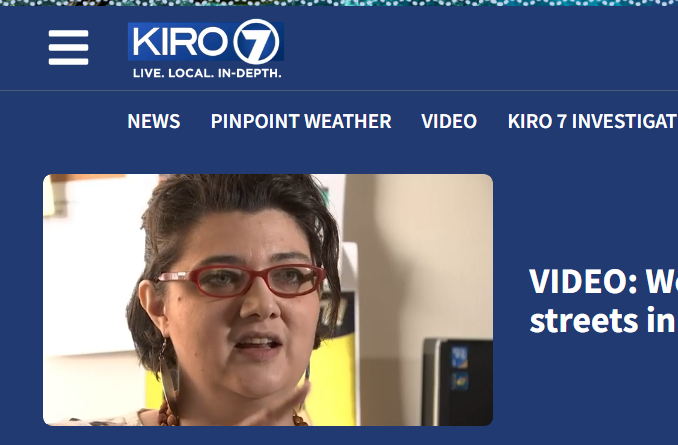
Women who walk the streets in Seattle say it’s now more dangerous
In my interview with KIRO 7 News, I spoke about the increasing dangers on Seattle's streets, particularly for vulnerable populations being exploited in the sex trade. I highlighted how street-level prostitution often leaves individuals more exposed to violence and exploitation. I emphasized that the focus should be on supporting those being exploited rather than criminalizing them, while holding buyers and traffickers accountable. As someone with lived experience, I reiterated the importance of creating safer pathways for individuals to exit the sex trade and addressing the systemic issues that perpetuate exploitation in our communities.
-

Busted How police brought down a tech-savvy prostitution network in Bellevue
In my interview with The Seattle Times, I highlighted the dangers of online platforms like The Review Board, which enabled men to exploit vulnerable women. I discussed how this site and others like it further exploit the buying and selling of women’s bodies into an organized criminal enterprise, where men feel entitled to commodify women. Reflecting on my own experiences, I emphasized that these platforms not only facilitated exploitation but also exposed women to extreme violence, as I was repeatedly raped, strangled, and assaulted by men from the site. This case underscored the need to hold buyers accountable and to shift focus towards supporting survivors of prostitution.
-

The harsh reality of Seattle prostitution
In my interview with MyNorthwest, I emphasized that prostitution is not a choice, but something that is done to people, describing it as a form of sex slavery where consent is often coerced through poverty and inequality. I explained that legitimizing sex as work removes the concept of true consent because money can turn a “no” into a “yes.” As part of the Ending Exploitation Collaborative, I spoke about Seattle’s efforts to fight sex trafficking, including the “Stopping Sexual Exploitation” program for sex buyers, which aims to address the harm caused by prostitution and the societal dynamics that lead to it. I stressed the importance of reducing demand and teaching boys to respect women, as this is essential to ending exploitation.
-

Much like safe injection sites, shouldn’t Seattle create safety for sex workers?
In my interview with KIRO News Radio, I argued strongly against normalizing or decriminalizing the sex trade, explaining that prostitution is inherently harmful. I pointed out that women in prostitution suffer from PTSD at twice the rate of returning war veterans, underscoring the extreme violence and trauma they endure. I made it clear that the sex trade commodifies and exploits vulnerable individuals, particularly those who are trafficked or coerced. While some advocate for decriminalization as a way to improve safety, I believe this approach overlooks the systemic harm and exploitation at the core of prostitution. It's important to note that the study mentioned in the last paragraph of the article has been reported faulty methodology, leading to misleading conclusions about the supposed benefits of decriminalization. My focus remains on reducing demand and offering exit strategies for those being exploited.
-

Inside the fight to take down online prostitution review boards
In my interview with ABC News, I discussed the dynamics of "The Review Board," an online platform used by sex buyers in Seattle. I explained that these review sites create a false sense of safety for those being prostituted, but in reality, they often lead to increased violence. I emphasized that the pressure to receive good reviews pushes women further into dangerous situations. While some argue that these sites help vet clients, I know from first hand experience they give buyers too much power and contribute to the exploitation of vulnerable women, rather than protecting them. My goal is to raise awareness about the true harms of prostitution and to advocate for the elimination of platforms like these that fuel exploitation.
-

In Seattle's approach to prostitution, city attorney made a pivot
In my interview with KIRO 7, I discussed the shift in Seattle’s approach to prostitution, where the focus has moved from arresting women in prostitution to targeting the buyers. I shared my own experience of how, in the past, there was an unspoken rule to arrest women but not buyers, which only created more barriers for women trying to exit prostitution, such as difficulty finding housing or jobs due to arrest records. Now, with programs like LEAD, more women are seeking help to leave the sex trade, and community perceptions are changing. I highlighted how crucial it is to remove these barriers and provide real support for women, as many have experienced sexual assault, domestic violence, and exploitation. This new approach is essential for giving women a chance to rebuild their lives.
-
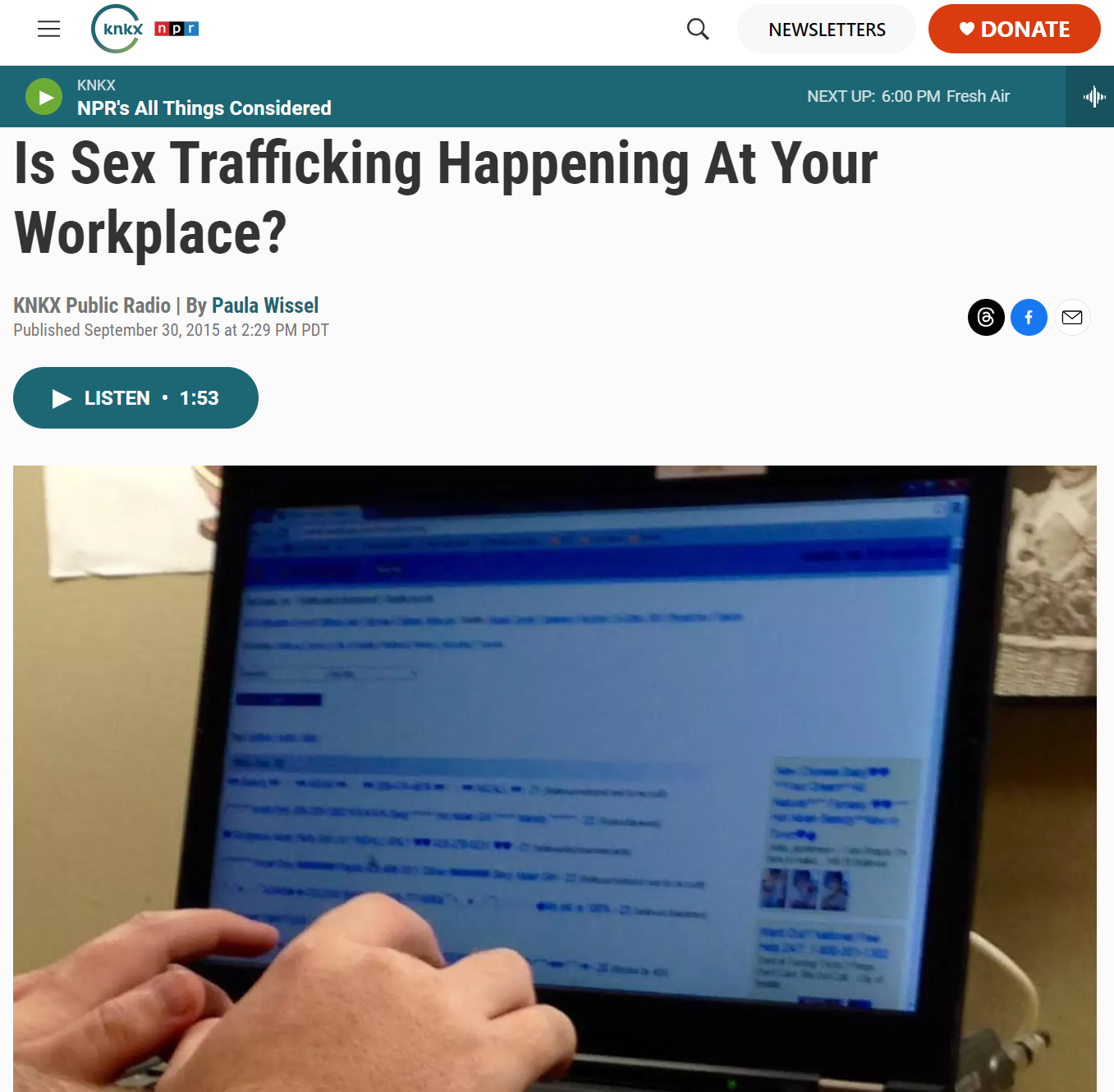
Is Sex Trafficking Happening At Your Workplace?
In my radio interview with KNKX NPR Seattle, discussed the disturbing reality of men soliciting sex during work hours. This is not uncommon, as studies show peak times for online sex solicitation often occur during the workday. I emphasized the importance of workplace involvement in combating sex trafficking, as organizations like Businesses Ending Slavery & Trafficking are working to educate employees and employers to recognize and report potential trafficking situations, aiming to curb demand by holding buyers accountable.
-

Is the New York Times Endorsing Legalization of Prostitution?
In my interview with Taina for HuffPost Contributors, I reflected on my painful experience attending an Amnesty International conference where I witnessed sex buyers and pimps promoting the decriminalization of prostitution. It was devastating to see Amnesty, a respected human rights organization, embrace the sex trade, despite the harm it causes to vulnerable individuals, especially women and girls of color. I emphasized that prostitution is not empowerment; it’s exploitation, and it perpetuates gender inequality and violence. Legalizing or decriminalizing the sex trade would only further oppress the most marginalized, rather than protect them.
-

‘Buyer Beware:’ King County taking aim at those who pay for sex
In my interview for The Seattle Times, I discussed the critical need for targeting sex buyers to combat human trafficking and exploitation, as highlighted in King County’s "Buyer Beware" campaign. I shared my perspective as a survivor of prostitution, emphasizing that holding buyers accountable is essential to reducing demand and stopping the cycle of exploitation. The campaign sends a clear message that purchasing sex is not a victimless crime but one that perpetuates harm, particularly to vulnerable women and girls. I stressed that addressing the demand side is a key strategy in dismantling the sex trade and protecting those who are exploited.